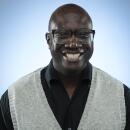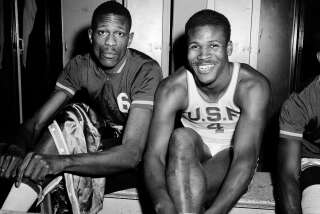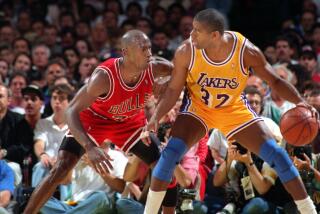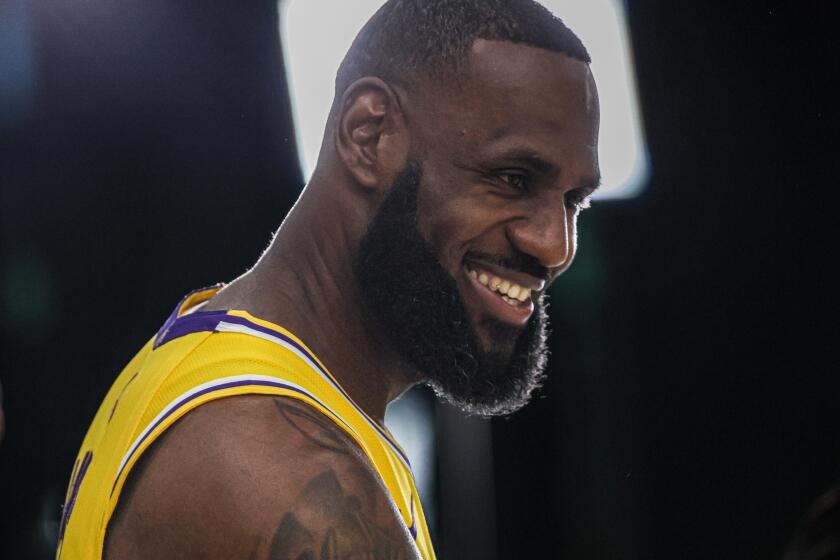
On April 1, around 9:15 a.m., Michael Cooper’s phone rang with the news that he finally had been elected to the Naismith Memorial Basketball Hall of Fame.
He was sitting next to his wife, Yvonne, both of them listening. Yet as he heard the words being delivered about one of the highest honors in basketball, Cooper had his doubts.
His former Lakers teammate Magic Johnson had been lobbying for years to get Cooper into the Hall of Fame and it had never happened. When he first heard the news, Cooper thought why should he believe it was true this time?
“First of all, I got the call on April Fool’s Day, April 1st, and I thought it was a joke at first,” Cooper said, laughing. “I was sitting next to my wife and I had the call on speakerphone and I was like, ‘Right. OK. This is a cruel April Fool’s joke.’ They said, ‘No, Coop, you got in.’ I was kind of staring and my wife said, ‘Babe, they said you got in.’ So, yeah, I didn’t really expect it because the time they called before I didn’t get in. But they said I was in. I was elated. I got up and started yelling, ‘I’m in the Hall of Fame!’”
Cooper, 68, said he was convinced this time because he spoke with Jerry Colangelo, the chairman of the Hall of Fame.
“I heard Mr. Colangelo’s voice so I knew it was real because the other times they had called me he was never on the line,” Cooper said. “It was always somebody else saying, ‘Hey, Coop, listen, the consideration went in. You were real close, but not this year.’ But now, I’m in the Hall of Fame!”

Cooper spent all 12 years of his NBA career with the Lakers, defense being his calling card on the Showtime Lakers, using his gifts to help them win five NBA championships during the 1980s with Johnson, Kareem Abdul-Jabbar, James Worthy, Byron Scott and coach Pat Riley.
Cooper was an eight-time NBA all-defensive player, five times first team. He was the defensive player of the year in 1987.
“I kept telling everybody, writing, telling everybody that you can’t judge the impact on just stats and numbers,” Johnson said. “Coop, he wasn’t really a sixth man, really. He played starters’ minutes. He was always finishing the games. He played the best of the best. They all said he was the best who guarded them. And then I said, who else has won defensive player of the year coming off the bench? The same year he hit six threes in the NBA championship and broke the record at that time.
“I tell people this: It’s when you perform in the biggest moments. His value to us was Hall of Fame-worthy. His value to the league — because now guys want to be defensive guys because of Coop. So, once he established himself on the offensive end, which he did — point guard, backing me up; he could play three positions, so, he was the first three-and-D [player]. He mastered that. And, so, that’s why I kept pushing, kept tweeting, kept sending letters. I’m just happy that everything turned out great, because if anybody deserves to be Hall of Fame-worthy and a Hall of Famer, it’s Michael Cooper.”
This special moment for Cooper came 34 years after playing in his final NBA game with the Lakers, and he will be celebrated during the ceremony Sunday in Springfield, Mass., with the likes of Vince Carter, Walter Davis and Chauncey Billups.
Yet the one person Cooper is most happy to be entering the Hall of Fame with is Jerry West, who died in June. West, who enters the Hall this time as a contributor after entering as a player and a member of the 1960 U.S. Olympic team, selected Cooper out of New Mexico in the third round of the 1978 draft with the 60th overall pick.
For Cooper, who attended Pasadena High and Pasadena City College, it meant the world to him to have West show that kind of faith in a slender 6-foot-5, 170-pound player.
“Jerry came down to New Mexico to see us play one time, but he came down to see Marvin Johnson,” Cooper, an assistant coach at Cal State L.A., recalled. “I think he came down to kind of really assess him and I think in the process of looking at him he saw me. So, when the draft came, I really believe had Chicago not drafted Marvin, the Lakers would have taken Marvin and I probably would have ended up somewhere else. But Chicago drafted Marvin in the second round and then in the third round I was there. That goes back to show how diligent Jerry was as far as his scouting and his viewing of players. I guess he liked my length, I was defensive-minded, and I’m glad things worked out the way they did.”

Cooper averaged 8.9 points, 4.2 assists and 1.2 steals during his career.
It was his defense that stood out, his willingness to take on the best offensive players and to never back down from an opponent.
“He was as competitive as [Michael] Jordan, Kobe [Bryant], Magic, anybody who has ever played this game,” former teammate Mychal Thompson said. “He had that same kind of fire and competitiveness and determination to win. He was not going to back down from anyone. He might have been ‘120 pounds,’ but he wasn’t going to let nobody intimidate him or make him back down. He was as tough of a player who has ever played this game. He dominated the game on the defensive end.”
When asked who were his toughest five for him to guard, Cooper quickly named Larry Bird, George Gervin, Andrew Toney, Jordan and Julius Erving.
“Of course Magic and Kareem, they were who they were, great leaders, but Cooper was like the glue, like the heartbeat of our team, man,” Worthy said. “He was brutally honest, emotional and whatever he had inside that body, he would give it 150% every night and every practice.
“Larry Bird doesn’t give too many compliments, but he said that Cooper was the toughest guy who defended him and he meant that. And, so, I’m elated and ecstatic that he’s getting to go in for defense. I think that speaks volumes of who he is, what his career stands for and what the game is all about. It’s about defending.”
For all the Lakers, the defining moment for them was finally beating the hated Boston Celtics in the 1985 NBA Finals. The Lakers had lost to the Celtics in the Finals eight consecutive times.
But they broke through and Cooper played a big role in that.

“If we don’t have Coop, we don’t win those series,” Byron Scott said.
“Having a guy like Coop who could come in and guard Larry and just specifically say, ‘I’m going to devote 100% of my effort on this end of the floor. Don’t even worry about the offensive end.’ But it just kind of freed up some other things. I think Larry said this over the years so many times that Coop was the best defensive player he ever played against. And if we don’t have Michael Cooper on that team, we don’t win those series. That’s how important he was to what we were doing on the defensive end because he made Larry work his ass off to score and that helped us on the other end as well. So, if we don’t have Coop, we don’t win those series.”
“I think winning in 1985 was probably our greatest moment,” Cooper said. “Obviously the first championship [in 1980] was one of them, but we had finally beat the Boston Celtics and with the Lakers organization never being able to do that, we were able to eradicate a lot of the ghosts from the past and it took a weight off Jerry’s shoulders because we had done something that he couldn’t do. So, it was kind of like a win for the city, for our organization and it kind of changed basketball, and I was just glad to a part of that series. The Celtics were a team you had to beat, Larry Bird was a guy that had to be stopped in order to beat them and I was right there in the mix.”
And now that he’s a member of the Hall of Fame, Cooper will have his No. 21 jersey retired on Jan. 13 at Crypto.com Arena.
All of this is so overwhelming for Cooper. He never even imagined playing in the NBA while growing up in Pasadena.
“The NBA was a far stretch for me. I never thought that in high school that I would play pro,” he said.
“So, when I got the opportunity to play for the Lakers, it was just about sticking. I didn’t want to be one and done, or two and done. I wanted to be around for a while. I was very fortunate to be able to do that. I played 12 years with the Lakers and just played the game for the love of the game. So, for this Hall of Fame to be bestowed on me, I’ve been blessed.”
More to Read
All things Lakers, all the time.
Get all the Lakers news you need in Dan Woike's weekly newsletter.
You may occasionally receive promotional content from the Los Angeles Times.








